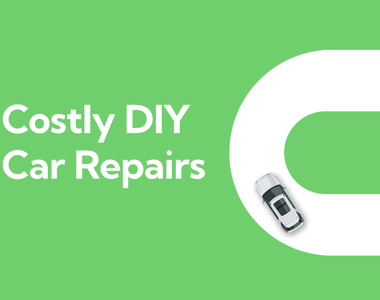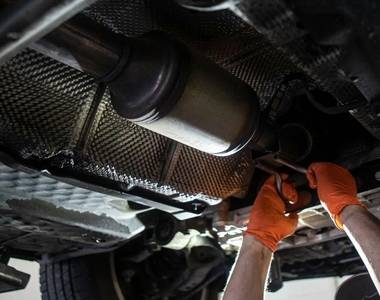If you want to get the most money possible for your car, selling it privately is your best bet. But it's also more time-consuming and requires some extra effort. This article outlines 12 steps to take that will simplify the process for you.

Selling your car privately is the best way to get the most money out of the sale. This article shows you the 12 steps you need to take to do it successfully.
How to Sell Your Car Privately in the UK: 12 Steps to Simplify the Process

If you want to sell your car, we're willing to bet you’d like to make as much money from the sale as possible.
You won't have to worry about commission fees if you cut out the middleman. And you could potentially get a better price than a dealership would offer.
Of course, you have to find a buyer yourself, and you assume the risk of the sale. Use these steps to make sure your private sale is taken care of the right way.
Selling Your Car Privately: A Quick Look
There are several reasons you might want to sell your car to a private buyer. Maybe you don't want to go through the hassle of working with a dealership or just want to get the best price possible. Or, you already have a few buyers lined up and you just want to carry through with the sale.
Before you decide a private sale is right for you, let's take a look at what that entails.
Prerequisites for Selling Your Car Privately
Technically, anyone can sell their car to whomever they like. But most private sellers don't have a background in sales, and you have to follow certain laws for a legal sale.
Before you sell your car privately, make sure you:
- have a car in working order.
- know all the information about it and how to present it.
- are aware of the legal and tax implications associated with selling your car privately.
- have orderly and up-to-date documents (V5C, MOT, service history, etc.).
- understand the current market value for a car like yours.
- are well-versed in auto industry market dynamics.
- have a marketing plan.
- plan to pay it off before the sale (if you are selling a car on finance).
Risks of Selling Your Car to a Private Buyer
Most people choose to sell their cars to a dealership because the private route entails considerable risk and inconvenience for most.
Let's examine some of the risks of a private sale more closely.
- You might get a bad deal. Though nobody is taking a cut of your cheque, you also have no assurance the buyer is offering a fair price. It’s up to you to know your car and its real market value. If your buyer knows more about the market than you, you could find yourself taken advantage of.
- Liabilities could arise. If you don't notify the DVLA once you sell your car (something a dealership would carry out on your behalf), UK law will hold you accountable for fines and other penalties imposed on the vehicle post-sale.
- There are legal ramifications. In the UK, it is against the law to sell a car that is not roadworthy. If you sell a car without an MOT without knowing it or sell a salvage car without disclosing that information, it will come back to bite you.
- You have to do all the paperwork yourself. When selling privately, you're responsible for transferring ownership information and liens on the vehicle. You also have to handle taxes related to the sale.
- Selling privately isn't free. You will have to market your vehicle, post it online, and possibly pay for ads to get the word out.
- You have to be available for test drives. If a buyer wants to take your car for a spin, you'll need to accompany them, which could disrupt your daily routine and cost you time.
12 Steps to Sell Your Car Privately
If you're aware of the risks and confident in your abilities, selling a car privately offers you the chance to sell it to whoever you want and present it exactly how you like.
Follow these 12 steps to ensure you have a profitable sale.
1. Address minor repairs and maintenance

Your first step to preparing your car for sale is addressing any repairs or maintenance it might need. Whether you have had a check-up recently or not, you will want to arrange a vehicle inspection to make sure everything runs smoothly and safely.
If your car's MOT is soon to expire (three to four months after you plan to sell), you should consider putting your car in for a new test as well. Potential buyers might assume it has problems otherwise.
If you have any damage to your vehicle, it is usually best to address it. You can sell a damaged car, but you won't get anywhere near as much for it. Especially if your damage is minimal (such as a curved fender or tiny scratch), a fix that costs a couple of hundred pounds could dramatically reduce the time it takes to sell the car.
It's also a good idea to fix your car's damage if it's a high-end model. A few dents and scratches are going to look more noticeable on a 2021 BMW than a 2008 Vauxhall.
The only time we advise against fixing damage to yours is when that cost is close to the total sale price. Do a quick cost/benefit analysis before you pull the trigger on any labour and materials.
2. Clean your car

You wouldn't buy a dirty car, so why should anyone else? Once you have your maintenance and repairs sorted, you'll have to make it look attractive inside and out for potential buyers.
You can carry out the cleaning process yourself, but we're going to be honest here. A professional detailing service will be the best £200 you've ever spent. Professional detailers remove tough stains, odors, and dirt to make your car look and smell like new.
An added benefit to this is it adds tremendous value to your vehicle. Mileage, vehicle condition, and accident history are more critical to the value equation, but having a shiny, well-maintained vehicle can help you fetch top dollar.
If you really want to improve your car's curb appeal, you could take your car cleaning a step further. Rather than polishing every surface, it helps even more to replace your seat covers, floor mats, and other interior accessories that get heavy use with newer ones.
3. Gather and organize important documents
If you want to sell your car legally (and seem trustworthy to buyers), there are a few documents you need to have on hand.
- V5C. Your V5C logbook is the most important document. It proves you are the owner and that your vehicle is registered in the UK. You can sell a car without a V5C, but you will seriously complicate the process. Not to mention, a lot of buyers won't trust the sale.
- MOT certificate. If your vehicle is over three years old, it needs an MOT certificate to drive legally on UK roads. You will have to provide a valid MOT before a sale goes through. Otherwise, your buyer cannot drive off with your car.
- Service history. Though this isn't a legal requirement, prospective buyers will almost always want to see the stamps in your service booklet. You can easily get more for a car that you properly cared for and took in for service every time it was due.
- Parts receipts. If you're selling a modified car, aftermarket parts receipts can help you prove the authenticity of your modifications and justify a higher asking price.
- Form V317. Car owners with private number plates they want to keep will have to fill out a V317 form and send it to the DVLA.
4. Obtain a vehicle history report
A vehicle history report will show your buyers everything that's happened to your vehicle since you owned it — insurance claims, accidents, odometer readings, and much more.
You can pull your vehicle's MOT history with our free MOT history checker tool. Then, you can find more vehicle information from the DVLA, including vehicle tax, accident history, and MOT mileage discrepancies.
5. Set a competitive asking price
Pricing your vehicle for sale is a little tricky. You want to reel in potential buyers, but you don't want to leave money on the table.
On the bright side, you aren't selling your car online or to a dealership. You can afford to shave a little off the asking price and still walk away with more.
Many factors come into play when valuing your car:
- Make, model, and year
- Mileage
- Seasonality and current demand
- Accident history
For a roundabout idea, use our car valuation calculator — we'll set a guide price for you.
6. Decide how and where to sell your car
The world is yours when you sell on your own set of wheels. This is a blessing and a curse.
There are a few places you can post your car for sale:
- Social media platforms
- Craigslist
- Facebook Marketplace
- eBay
- Classified sites
- Auctions
Car auctions are usually only a good idea if you're selling a classic car. They're great for finding clued-in buyers who know the true value of your vehicle, landing you higher bids and a better sale price.
For most sellers, it's best to list your vehicle in as many places as possible. Online marketplaces and social media are the easiest to start with. Classified sites are your next best bet because they have millions of users — however, you'll have to pay to place an advert.
In general, we recommend selling your non-running car or damaged car for cheap on a site like Facebook Marketplace. If you have a nicer, newer car, classified sites are a better bet.
7. Take photos of your car

The more professional, the better. When people are scrolling online and looking at listings, your photos need to be the reason they stop.
The goal of your photos is to show them the entire car — inside and out. During your photoshoot, make sure to include the following:
- The front, back, and sides with the doors closed
- The exterior with the hood open
- All-around photos of the engine bay
- Steering wheel, dashboard, and centre console
- The front and back seats (plus close-ups to show the material)
- The floor
- The trunk
- Unique details, such as custom rims or bodywork
- Shots that show off features like heated seats, audio systems or a sunroof
- Close-up shots of special add-ons (such as bike racks)
- Photos that demonstrate roadworthiness and safety features like brakes
- Damage (if any)
On your listing, your cover photo should be a standard photo from the outside with the doors closed. To get the best shots, visit an empty parking lot or a quiet street. For optimal lighting, take your shots an hour after sunrise or an hour before sunset.
8. Choose the right advertising platforms
Put yourself in your buyer's shoes. If you were looking for a car online, where would you go?
Most people look for cars on sites like Autotrader and Gumtree. If you list on these sites, they have auto-fill options that let you quickly and easily upload important information about your car. If you do decide to go this route, we recommend looking at all your listing site options before spending the money because each site will offer a different charge for what you're looking for.
You could also think outside the box. Other popular places to promote your car include Facebook Marketplace and eBay, but these are generally better for runarounds and cheap second-hand cars. If you're selling a classic car, consider listing on specialist sites and joining Facebook groups.
9. Arrange and conduct test drives
You'll have to make yourself available for those who want to try before buying. When someone clicks your advert and lets you know they're interested, you can ask them a few preliminary questions about what they're looking for, their budget, and their driving experience.
From there, you can schedule a time when they can come to your house (or wherever you're storing the car) and take it for a spin. You can even accompany them and answer questions while they drive.
Before accepting a test drive, there are two things you must check every driver for:
- A driving licence
- Driving Other Cars (DOC) cover
For extra protection, you should also take a photo of the driver's licence before they get in the car and drive away.
10. Schedule viewings
Aside from test drives, people will also want to view your car. To close the sale as quickly as possible, keep your car in good condition and be available for viewings as often as possible.
If you list it on a popular classified site and have high engagement, you might find it easier to schedule a two-hour time over the weekend when anyone can come to view it.
Interested buyers may also turn up with a professional mechanic or inspector to check the car over. To make it as easy as possible, keep your vehicle history handy and block off enough time for each viewing to allow inspections.
11. Finalise the sale

Once you find an interested buyer, negotiation is the name of the game. Ahead of negotiations, it helps to have a roundabout percentage in mind that you're willing to drop the price.
It's better to let the buyer bring up negotiations — and when they do, don't be afraid to act confidently. If you've followed everything in this guide up to now, chances are good your car is desirable.
You should also let the buyer make the first offer. Feel free to counter offer if it's short of what you were hoping for.
If you and your prospect can't arrive at a number you're both happy with, it's okay to let them walk away. They might have a change of heart, or you may receive a phone call from another interested buyer the second they leave your house.
Once you arrive at a number you are happy with, make sure to set forth terms and conditions for your buyer. Ask them to put down a deposit, record it with a receipt and set rules for how long they have to complete the remaining payment.
12. Arrange payment
Your buyer won't have thousands of pounds sitting in their pocket (not that you would want to sell your car without proper documentation, anyway). Most likely, they will agree to a sale, put down their deposit and arrange a time to pay the rest.
There are three main ways people accept payment:
- Cash. Cash is the safest way to be paid because you can accept it on the spot. Many buyers prefer to buy cars in cash because there's no lead time like there is with bank transfers. If you are concerned about forged notes, you can always take the buyer to a bank and have them pay you in front of the teller.
- Bank transfer. Bank transfer is the easiest way, but it will take longer. You can carry out a bank transfer through an app, money transfer or online banking. Do not hand them the keys until the money is in your account.
- Cheque or banker's draft. If your buyer wants to do it the old fashioned way, they can also pay by cheque or banker's draft. As always, wait until it clears for the sale to be complete.
After the sale, create two copies of the final sale receipt — one for you and one for them. your receipt should include the make, model, year of manufacture, mileage, agreed upon price, and a note saying it was "sold as seen" to avoid future disputes.
Then, sign each receipt and ask your buyer to do the same.
What paperwork do I need to sell my car privately?
To recap, you need the following documents to sell your car privately:
- V5C logbook
- Valid MOT certificate
- Maintenance invoices/vehicle history
- Parts receipts
- Sale terms
- Four receipts (two for deposit, two for final sale)
Depending on your buyer or how you choose to sell it, there may be other documents required to sell your car as well.
Wrapping Up
When done right, selling your car privately can be an efficient way to move it off your drive and make some money in the process.
The most important thing to remember is to be honest and upfront with the buyer. If you make sure they know exactly what they're getting, have all the paperwork in order and offer a good price, you'll definitely find a willing taker for your car.
Want to learn more? Here are the questions our sellers ask us the most.
Does a private seller have to accept returns?
A private seller does not have to accept returns. Make sure to include clauses in your sale terms specifying that the car is sold as seen. However, if your car has an issue that could result in legal trouble (such as an invalid MOT certificate or emissions failure), then it would be in your best interest to accept the car back.
How do I fill in the v5 when selling a car privately?
When selling a car privately, you will fill out sections 2 and 6 of your V5C logbook. The easiest way to do this is online through the DVLA's website. Once you're finished, the DVLA will mail a new document to your buyer, who will then be the legal owner of the car.
Do you have to pay tax on a private car sale in the UK?
Private cars are not subject to Capital Gains Tax if they are personal vehicles. However, taxi cabs, hire cars, and vehicles used for business purposes do have to pay taxes. If you are unsure, it's best to speak with a tax advisor before selling your car privately.
How do I write a receipt for a private car sale in the UK?
To write a receipt for a private car sale in the UK, include the following information: date of purchase, name and address of the buyer, make and model of the car, year of manufacture, mileage at the time of sale, agreed-upon price, and payment method. Then sign both copies and ask the buyer to do the same.
How do I pay for a used car from a private seller in the UK?
To pay for a used car from a private seller in the UK, you can use cash, a bank transfer, or a cheque. Make sure to create four copies of the receipt (two for deposit and two for the final sale) and sign them both before handing over the keys.
Why should I sell my car privately instead of trading it in or using a dealership?
The main reason someone would consider selling a car privately is that it can be much more lucrative than trade-in or dealership offers. Private sellers often ask higher prices for their cars, and they don't have to pay dealer fees, commissions, or other hidden costs.
What are the benefits of selling my car privately?
Benefits of selling your car privately include being able to set the price you want, eliminating hidden fees and commissions, and the ability to control the sale process. It also allows you to get more money for your car than a trade-in or dealership offer would. Depending on the type of car you're selling, you may also have the opportunity to make connections with other car enthusiasts.
What payment methods should I accept when selling my car privately?
Ideally, you should only accept cash and bank transfer when selling your car or other vehicle privately. Cash is the safest way to be paid because you can accept it on the spot, but bank transfers are easy for buyers to arrange. If your buyer insists on paying by cheque or banker's draft, make sure to wait until it clears before handing over the keys.
What are the common mistakes to avoid when selling a car privately?
The most important mistake to avoid when selling your car privately is being dishonest with the buyer. Do not try to hide any issues or faults, and make sure to include any relevant documents such as receipts, MOT certificates, or vehicle history. You should also avoid giving your buyer the keys until you have the money in your account to avoid being scammed.
How long does it typically take to sell a car privately in the UK?
The amount of time varies wildly depending on the type of car, its condition, and whether you decide to use a car-selling platform or sell it on your own. If you posted an advert on a classified site, it can take as little as 1-2 days to connect with potential buyers. If your car is old and rundown, overpriced, or listed during low season, it might sit for weeks or months before you find a buyer.
What are the alternatives if I'm struggling to sell my car privately?
If you're struggling to sell your car privately, your main options are to use a car-selling platform to sell it online, trade in or part exchange it with a dealership, or scrap it. Each option has its own advantages and drawbacks. Make sure to do your research before deciding which is best for you.










